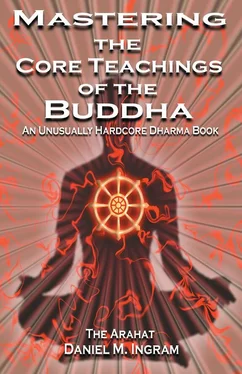Daniel Ingram - Mastering the Core Teachings of Buddha - An Unusually Hardcore Dharma Book
Здесь есть возможность читать онлайн «Daniel Ingram - Mastering the Core Teachings of Buddha - An Unusually Hardcore Dharma Book» весь текст электронной книги совершенно бесплатно (целиком полную версию без сокращений). В некоторых случаях можно слушать аудио, скачать через торрент в формате fb2 и присутствует краткое содержание. Год выпуска: 2009, ISBN: 2009, Издательство: Aeon Books, Жанр: Старинная литература, на русском языке. Описание произведения, (предисловие) а так же отзывы посетителей доступны на портале библиотеки ЛибКат.
- Название:Mastering the Core Teachings of Buddha - An Unusually Hardcore Dharma Book
- Автор:
- Издательство:Aeon Books
- Жанр:
- Год:2009
- ISBN:9781904658405
- Рейтинг книги:5 / 5. Голосов: 1
-
Избранное:Добавить в избранное
- Отзывы:
-
Ваша оценка:
- 100
- 1
- 2
- 3
- 4
- 5
Mastering the Core Teachings of Buddha - An Unusually Hardcore Dharma Book: краткое содержание, описание и аннотация
Предлагаем к чтению аннотацию, описание, краткое содержание или предисловие (зависит от того, что написал сам автор книги «Mastering the Core Teachings of Buddha - An Unusually Hardcore Dharma Book»). Если вы не нашли необходимую информацию о книге — напишите в комментариях, мы постараемся отыскать её.
Mastering the Core Teachings of Buddha - An Unusually Hardcore Dharma Book — читать онлайн бесплатно полную книгу (весь текст) целиком
Ниже представлен текст книги, разбитый по страницам. Система сохранения места последней прочитанной страницы, позволяет с удобством читать онлайн бесплатно книгу «Mastering the Core Teachings of Buddha - An Unusually Hardcore Dharma Book», без необходимости каждый раз заново искать на чём Вы остановились. Поставьте закладку, и сможете в любой момент перейти на страницу, на которой закончили чтение.
Интервал:
Закладка:
One more little carrot: it is rightly said that to deeply understand any two of the characteristics simultaneously is to understand the third, and this understanding is sufficient to cause immediate first awakening.
33
THE FIVE SPIRITUAL FACULTIES
The Five Spiritual Faculties are said to be like a cart with four wheels and a driver. If any of the four wheels is too small or wobbly or not in balance with the others, then the going on the spiritual road will be rough. If the driver is not paying attention then there will also be problems. The four wheels symbolize faith , wisdom , ener gy and conce ntratio n. The driver symbolizes mindful nes s.
This is really a useful little teaching and quite a fine list. The trick is that faith and wisdom must both be made strong and kept in balance, as must energy and concentration. Mindfulness may always be increased, so for this one the sky is the limit, but don't be too obsessive about it.
This sounds really simple and perhaps obvious, but there is quite a lot here, and on the spiritual path it is worth checking up on ourselves regularly and asking if the first four are all strong and in balance and if we might be just a bit more mindful.
FAITH AND WISDOM
Let's start with faith and wisdom . Faith in deficiency can lead to cynicism, giving up, half-hearted effort, and bitterness. Faith in excess can lead to blind adherence to dogma, sectarian arrogance, being disappointed when you realize that your teachers are human, an inability to realistically examine and revise your approach to spirituality when necessary, and many other problems. Wisdom in deficiency can lead to stupidity, blindness, gullibility, and foolish interpretations of the teachings. Wisdom in excess can lead to harmful cleverness, vanity about one's insights, an overemphasis on knowledge and study over practice and direct experience, and desperate attempts to think yourself to enlightenment. (Note: Zen koan training is something else entirely.) You can see that an excess of wisdom is similar to a lack of faith, and an excess of faith is similar to a lack of wisdom. When this balance is right there is a heartfelt steadiness, a quality of balanced and genuine inquiry, an ability to persevere and yet a certain humility. Faith at its best produces deep gratitude for life in all its richness, for its lessons, difficulties and blessings, and for the chance to awaken. Wisdom at its best comes from deep investigation of life as it is and goes far beyond
The Five Spiritual Faculties
the reach of reason and rational thought, transcending the paradoxes that these inevitably create. In the end, wisdom and faith converge.
How do we apply this? Most of us will suffer from imbalances of wisdom or faith with some regularity. So if things are going a bit off, just check in with the Five Spiritual Faculties and ask, “Could I perhaps work a bit on wisdom, faith, or bringing these into balance?” This is a powerful question and, if we are willing to be honest with ourselves, it can correct a lot of errors on the spiritual path. Another good way to apply this is to look at the list of symptoms of imbalance above and see if perhaps some of these apply to us. This is an easy way to see what might need some attention.
ENERGY AND CONCENTRATION
Energy and conce ntratio n work just the same way: they must both be strong but must also be in balance. When energy is deficient there is sloth, torpor, dullness, and tiredness. When energy is in excess the mind and body may be restless, jumpy, strained, and irritable. It may even be unable to focus at all because so much emphasis is being placed on effort itself. When concentration is deficient the mind won't stay with an object and tends to get lost in thought. When concentration is in excess one can get lost in one's objects or be focused too narrowly and tightly for reality to “breathe.” Again, too much energy is related to a lack of concentration and vice versa.
When this balance is right, the posture is straight and steady but not rigid, and the mind is bright and focused steadily on objects and their back and forth interplay. When energy and concentration begin to come on line without mindfulness being strong yet, the mind may be prone to getting caught in obsessive thinking fueled by the strong energy and concentration, so watch for this and stay grounded in physical objects.
So, simply pay attention to how your practice is going and adjust the levels of energy and concentration accordingly. Finding the balance takes time, and may require regular readjustment as we learn to use the power of our minds. Sometimes it is helpful to be very gentle with our attention, as if we were trying to feel the wind on our skin from the flapping of a nearby butterfly’s wings. Sometimes it is helpful to use our 35
The Five Spiritual Faculties
attention like a machine gun. Often we do just fine somewhere in between.
A willingness to play around with various combinations of energy and concentration produces the necessary personal experience to figure out what helps and what is too much or too little. Many of the problems that meditators come to ask meditation teachers about when they are doing their practice relate directly to just balancing energy and concentration, so engage with what that might mean and see if you can apply this little teaching to help you see clearly.
MINDFULNESS
Mindful nes s is in a category all by itself, as it can balance and perfect all the others. This does not mean that one shouldn't be informed by the other two pairs, but that mindfulness is really, really important. Mindfulness means knowing what is as it is right now. It is the quality of mind that knows things as they are. If you are trying to do this you are balancing energy and concentration, and also balancing faith and wisdom. From energy the mind is alert and attentive, from concentration it is stable. Faith here may also mean acceptance, and wisdom here is clear comprehension.
Notice that this has nothing do to with some sort of vague spacing out in which we wish that reality would go away and our thoughts would never arise again. I don't know where people get the idea that vague aversion to experience and thought is related to insight practice, but it seems to be a common one. Mindfulness is about being very clear about our actual reality as it actually is. It is about being here now. The ultimate truth is found in the ordinary sensations that make up our world. If you are not mindful of them or reject them because you are looking for “depth” and “transcendence,” then you will be unable to appreciate what they have to teach and be unable to do insight practices.
So, if you know things just as they are this is enough. We just keep coming back to that one, don't we, but from lots of different angles.
Each one of these angles might be useful to you at different times, and having a few little lists to look at as we walk our path can bring fresh perspectives and keep us from getting stuck.
The Five Spiritual Faculties have also been presented in another order that can be useful: faith, energy, mindfulness, concentration and 36
The Five Spiritual Faculties
wisdom. In this order, they apply to each of the Three Trainings. We have faith that training in morality is a good idea and that we can do it, so we exert energy to live up to a standard of clear and skillful living.
We realize that we must pay attention to our thoughts, words and deeds in order to do this, so we try to be mindful of them. We realize that we often fail to pay attention, so we try to increase our ability to concentrate on how we live our life. In this way, through experience, we become wiser in a relative sense, learning how to live a good and useful life.
Seeing our skill improve and the benefits it has for our life, we generate more faith, and so on.
Читать дальшеИнтервал:
Закладка:
Похожие книги на «Mastering the Core Teachings of Buddha - An Unusually Hardcore Dharma Book»
Представляем Вашему вниманию похожие книги на «Mastering the Core Teachings of Buddha - An Unusually Hardcore Dharma Book» списком для выбора. Мы отобрали схожую по названию и смыслу литературу в надежде предоставить читателям больше вариантов отыскать новые, интересные, ещё непрочитанные произведения.
Обсуждение, отзывы о книге «Mastering the Core Teachings of Buddha - An Unusually Hardcore Dharma Book» и просто собственные мнения читателей. Оставьте ваши комментарии, напишите, что Вы думаете о произведении, его смысле или главных героях. Укажите что конкретно понравилось, а что нет, и почему Вы так считаете.












